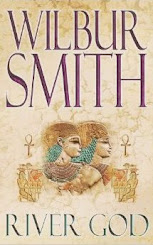first published in
The Malay Mail Online, 26 December 2015
Majestic scenery, rich history, epic battles, heroic feats and interesting characters. Plus betrayal, murder, politics and a bit of comedy — all told by a snooty eunuch slave. Welcome to Wilbur Smith's ancient Egypt.
I stumbled upon
River God while browsing in a comic rental shop in the neighbourhood, which has since closed. It was so long ago, I can't remember if I'd put the book down or when I decided to get my own copy, which I had to ditch because it got so old and brown and the pages were warped.
But that world stayed with me, not just because of my interest in that bygone realm.
The novel's titular river god, Hapi, is said not to be the god of the Nile itself, but of the Nile's annual flooding, which ran like clockwork except for a few times in Egypt's long history. So he was a big deal, even if he isn't as culturally popular as Ra, Horus, Anubis or Isis.
From the details within, Smith's historic epic takes place somewhere in the Middle Kingdom period between 2000 and 1700 BC, but this has been contested. Salitis, one of the antagonists, appears about halfway through. He is believed to be the first Hyksos ruler of the kingdom, reigning during the
Fifteenth Dynasty (around 1650 to 1550 BC).
So, yes, the timeline's off about several decades. However, this and other factual discrepancies (if you can find them) doesn't affect the flow and charm of the novel.
Many other characters appear to be fictional, such as Mamose VIII, the reigning pharaoh in the beginning of the novel. Gaps in Egypt's past, which are still being filled today, have become blank canvasses or pages for authors and artists, making for a richer, more fantastical historical account.
Smith's ancient Egypt unfurled like a miles-long mural, imaginary hieroglyphics and all, of a kingdom in decline, a foreign invasion, our heroes' exile and their triumphant return. Wedged in between are chapters on how our heroes: the eunuch slave Taita and his wards — the handsome young soldier Tanus and his mistress Lostris — played their part in it all.
Lyrical, immersive and vivid, with just the right amount of detail, Smith's writing puts us where the action is. In the harems, the rustle of fine linen and the fragrance of perfume. On the banks of the Nile, the splash of oars and burbling of water as boats skim across the surface of the great river. In the midst of battle, the cries of men and beasts rise above the rumble of war chariots and the clashing of weapons.
We are treated to sweeping vistas of endless desert, African savannah and mountain ranges in what could now be northern Ethiopia. We venture into the workshops of artisans as they labour on the pharaoh's tomb and, much later, follow a royal funeral procession to its destination. Our hearts tighten as we witness an elephant hunt go wrong.
And, oh, to watch an assassin's cobra being prepared and cooked by our somewhat unreliable narrator...
Taita's a treat. From time to time, the bombastic, vainglorious slave reminds us that the households and people he serves would be in even bigger trouble without him. Actor, strategist, spy, street magician, negotiator, painter, scribe, poet, playwright, inventor... he's done it all. To call him an ancient Egyptian da Vinci would probably not suffice.
Thankfully, this Marty Stu doesn't hog the papyrus. I've also come to admire the roguish, daredevil Kratas, an officer in Tanus's regiment and the young hero's wingman. Huy, a former bandit turned army officer and groom, steals the scene from Taita as he schools the self-proclaimed genius on the art of handling horses, a "new" animal in Smith's Egypt. Even the weak, vacillating Mamose VIII has his moments, including one where he looms like a thundercloud over a bunch of criminals before sentencing them.
I'm not surprised even our
Tun M likes Smith's work.
Not long after I'd finished River God, I returned to the shop and borrowed the sequel.
The Seventh Scroll takes place centuries later and details the search for the tomb of Mamose VIII by a more modern set of characters. This one was more of an action-adventure potboiler, like
Those in Peril, so it didn't appeal as much to me.
Smith returned to Taita's Egypt years later, churning out more sequels where our slave turned hero becomes a real magician (
Warlock and
The Quest) and what appears to be an interquel between
River God and
Warlock. But I think the first novel will always rank among his best works.
Still, I didn't replace my own aged copy of
River God when the chance came (sorry, Big Bad Wolf Books). Perhaps it wasn't time to revisit that world again and the painful chapters in it. Maybe it's the fear of being sucked back in there, just as I'm finding new things to read.
Or maybe it's just that these days I'm taking longer to muster the will to plough through anything longer than 500 pages.
But I urge you to. This is one adventure everyone needs to experience.
28/12/2015 One thing: There were times in Egypt's history when the banks of the Nile were not sufficiently inundated and fertilised by the silt-bearing waters. For the most part, the annual flooding ran like clockwork, until the Aswan Dam was built.
River God
Wilbur Smith
Pan Books (2007)
672 pages
Fiction
ISBN: 9780330449939




